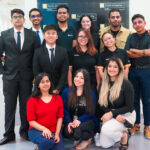When it comes to women in the workplace, Curtin graduate Noor Aftab means business.
When Curtin University interviewed business and information technology graduate Noor Aftab in 2010 about her role as Head of Investments at the First Women bank in Pakistan, it was her first ever interview.
Six years on, Aftab has given interviews for the BBC, the Hindustan Times, Express Tribune and Martha’s Vineyard Times. She has spoken at more than 300 events in fourteen countries, including delivering seven keynote speeches in the US, Europe, India and China. She also presented a Ted X Islamabad talk in April that has since been viewed more than 38,000 times.
The reason for this media exposure? Noor Aftab has made it her mission to empower women in Pakistan and throughout the world by getting them into the workforce. She wants to instill in women (and men) the belief that women can and should pursue a career, and is working to break down cultural barriers that may prevent women from doing so.
“Despite celebrating International Women’s Day for more than 100 years, very little has changed for women when it comes to their economic empowerment,” says Aftab. “For every dollar a man earns, a woman earns 77 cents. These numbers are for the US; in Pakistan, women earn one rupee to every man’s five [rupees].”
To address this economic disparity, Aftab launched the International Women Economic Council (IWEC) in 2011, and official operations began early this year. The IWEC is a global movement aimed at increasing the number of women in the workforce through political, academic and corporate partnerships. It also provides networking and business opportunities for stay-at-home mothers, and improves working conditions for female entrepreneurs.
So far, the IWEC has partnered with Pakistan branches of the Society of Human Resources Management to spread its gender equality message, and is also working with more than 30 corporations in Pakistan to conduct training for women in healthcare, finance, IT, education and government sectors.
“The training has had a major impact in transforming the thinking of these organisations, while empowering female staff to be confident, take charge and make the changes they aspire to see,” says Aftab.
“Our biggest success to-date is partnering with the United Nations Industrial Development Organisation and Islamabad Chamber of Commerce and Industry, to launch the Women Business Incubator where we help local women entrepreneurs to start and continue their own business,” says Aftab.
Aftab’s motivation to establish the IWEC was in part due to her own experiences as a business woman, where she had to constantly battle to be seen as a valuable and skilful employee, and not a woman who ‘carried the files’.
Determined to prove that gender was not exclusive to career success, Aftab worked hard to be at the top of her field and in 2009 became one of the few female treasurers in the history of Pakistan to work for a commercial bank. She was also the Head of ACCA Islamabad and managed the President of Pakistan’s investment portfolio of $49.6 billion.
“It wasn’t until I started working at First Women Bank that I had the uncomfortable realisation of how different I was. I was a round peg in a world of square blocks. At 29 years of age [I was] a strong, single, financially independent woman with bold thinking. This made women and men around me very uncomfortable.”
Aftab’s experience as an investment banker was also a driving force for establishing the IWEC. Her job, she says, is to increase profit or cut losses.
“There are substantial losses when women don’t join the workforce, or are in the workforce but not living their full potential,” she says.
Her views are backed up by data from the 2015 Global Gender Gap Report, which states that ‘people and their talents are among the core drivers of sustainable, long-term economic growth. If half of these talents are underdeveloped or underutilised, growth and sustainability will be compromised’.
According to Aftab, the reason why many women don’t work, or don’t pursue higher roles in their chosen field, is often due to cultural conditioning.
“We need to understand that many women have had a lifetime of training in being the ‘nice girl’ – the girl who follows all the rules, creates no fuss and never says ‘no’. At work, we tend to be compromising, collaborative (giving others credit for our work) and non-confronting. Our problem is not that we are too bossy or aggressive, our problem is that we are not bold enough,” she explains.
In April this year, the IWEC launched an advocacy campaign with Aftab’s Ted X Islamabad talk, ‘Right Ring Revolution’, where she encourages women to be bold when it comes to business and work, and to see their worth as individuals.
[youtube]https://www.youtube.com/watch?v=z_bGf_PD19M[/youtube]
Since the talk went live, Aftab says she sees change happening all around Pakistan, a country ranked the lowest of 145 countries for gender disparity in the 2015 Global Gender Gap Report.
“Every day we are flooded with messages from women telling us how they are standing up for their rights, making progress at work and investing in their careers. We hear from men saying their perspective on working women has transformed, and from fathers saying they will invest in their daughter’s education and career.”
Aftab has won several awards for her roles in business and gender equality including the 2016 Australia Alumni Award for Business Leadership, which honours the work of Australian alumni in Pakistan. In 2012, Aftab won the Woman Super Achiever Award for creating business solutions and for excellence in public and private financial management, and 2011 she won the Outstanding Women Achievement Award for her work in developing womens’ business and improving their access to finance.
So what advice does this pioneering woman have for women who want to succeed in business?
“It’s not easy being a working woman. It’s even harder being a business woman,” she says. “But if you dream for it, have a strong family support network, tap into your professional network and use sharing and gratitude, it is not only possible but will become natural.”
Know no barriers with a Women in MBA scholarship
The Women in MBA Scholarship has been developed by Curtin Graduate School of Business (CGSB) to encourage and support female students who have chosen to study a Master of Business Administration (MBA) either as a full-time or part-time student at CGSB and to establish the employer sponsorship.



